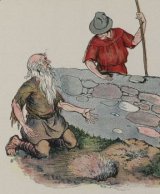The Miser
"The Miser" is a short fable by Aesop revolving around the theme of greed and disillusionment. The story features a man who buries his gold in a hidden hole. Every week he visits the spot to adore his wealth. One day he finds the gold stolen and in agony, he cries over his loss. A neighbor, having noticed his routine, explains that he might as well bury a stone, for all the good the gold did him. The tale effectively emphasizes the concept that unused riches are as useless as nonexistent ones.
A Miser had buried his gold in a secret place in his garden. Every day he went to the spot, dug up the treasure and counted it piece by piece to make sure it was all there. He made so many trips that a Thief, who had been observing him, guessed what it was the Miser had hidden, and one night quietly dug up the treasure and made off with it. When the Miser discovered his loss, he was overcome with grief and despair. He groaned and cried and tore his hair. A passerby heard his cries and asked what had happened. "My gold! O my gold!" cried the Miser, wildly, "someone has robbed me!" "Your gold! There in that hole? Why did you put it there? Why did you not keep it in the house where you could easily get it when you had to buy things?" "Buy!" screamed the Miser angrily. "Why, I never touched the gold. I couldn't think of spending any of it." The stranger picked up a large stone and threw it into the hole. "If that is the case," he said, "cover up that stone. It is worth just as much to you as the treasure you lost!" A possession is worth no more than the use we make of it.
Translation
Translate and read this book in other languages:
Select another language:
- - Select -
- 简体中文 (Chinese - Simplified)
- 繁體中文 (Chinese - Traditional)
- Español (Spanish)
- Esperanto (Esperanto)
- 日本語 (Japanese)
- Português (Portuguese)
- Deutsch (German)
- العربية (Arabic)
- Français (French)
- Русский (Russian)
- ಕನ್ನಡ (Kannada)
- 한국어 (Korean)
- עברית (Hebrew)
- Gaeilge (Irish)
- Українська (Ukrainian)
- اردو (Urdu)
- Magyar (Hungarian)
- मानक हिन्दी (Hindi)
- Indonesia (Indonesian)
- Italiano (Italian)
- தமிழ் (Tamil)
- Türkçe (Turkish)
- తెలుగు (Telugu)
- ภาษาไทย (Thai)
- Tiếng Việt (Vietnamese)
- Čeština (Czech)
- Polski (Polish)
- Bahasa Indonesia (Indonesian)
- Românește (Romanian)
- Nederlands (Dutch)
- Ελληνικά (Greek)
- Latinum (Latin)
- Svenska (Swedish)
- Dansk (Danish)
- Suomi (Finnish)
- فارسی (Persian)
- ייִדיש (Yiddish)
- հայերեն (Armenian)
- Norsk (Norwegian)
- English (English)
Citation
Use the citation below to add this book to your bibliography:
Style:MLAChicagoAPA
"The Miser Books." Literature.com. STANDS4 LLC, 2025. Web. 22 Feb. 2025. <https://www.literature.com/book/the_miser_2365>.








Discuss this The Miser book with the community:
Report Comment
We're doing our best to make sure our content is useful, accurate and safe.
If by any chance you spot an inappropriate comment while navigating through our website please use this form to let us know, and we'll take care of it shortly.
Attachment
You need to be logged in to favorite.
Log In